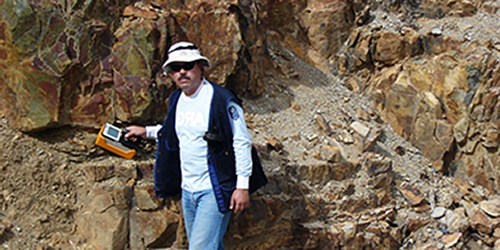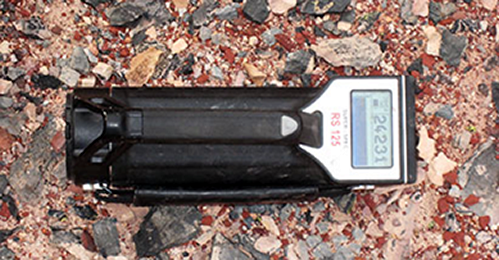RADIOMETRY
Radiometry measures certain energy Windows associated to unstable isotopes, therefore there can be done certain determinations relative to radioactive elements concentration associated to minerals in rocks, soil and solution in the first dozens of meters on the ground.
Multichannel spectrometer not only detect photons Y but also determine their energy and carry out a statistical register during the sounding time, which can vary from 1s to 9999s. The sensor normally used is sodium lodide (Nal) as sensitive gamma element. With this kind of spectrometers, a Geophysic can determine the radiogenic contributions from uranium, thorium, potassium and any transition unstable element from the group Y, being able to determine lithological aspects, soil geochemistry, etc.
It is an excellent method for exploring minerals to discriminate volcanic units from sedimentary volcano, as well as identify through potassium content, argillic alterations. The Th high content are great tracers in rare earths deposits. In the uranium deposits prospection, radiometry is absolutely important to any type of deposit model.
In environmental monitoring, it is used to detect chemical alterations caused to the soil by the action of pollution elements or the detection of fluid with substances with some kind of transmitter, recognize areas exposed to the presence of argon, radon and other radiogenic element.
Geophysics Argentina uses up-to-date technology model RS 125 Super Spec, 1024 channels.
Multichannel spectrometer not only detect photons Y but also determine their energy and carry out a statistical register during the sounding time, which can vary from 1s to 9999s. The sensor normally used is sodium lodide (Nal) as sensitive gamma element. With this kind of spectrometers, a Geophysic can determine the radiogenic contributions from uranium, thorium, potassium and any transition unstable element from the group Y, being able to determine lithological aspects, soil geochemistry, etc.
It is an excellent method for exploring minerals to discriminate volcanic units from sedimentary volcano, as well as identify through potassium content, argillic alterations. The Th high content are great tracers in rare earths deposits. In the uranium deposits prospection, radiometry is absolutely important to any type of deposit model.
In environmental monitoring, it is used to detect chemical alterations caused to the soil by the action of pollution elements or the detection of fluid with substances with some kind of transmitter, recognize areas exposed to the presence of argon, radon and other radiogenic element.
Geophysics Argentina uses up-to-date technology model RS 125 Super Spec, 1024 channels.

 Gamma rays spectrometer RS 125
Gamma rays spectrometer RS 125MAIN APPLICATIONS
- Minerals, oil and gas exploration
- Quanti-qualitative gamma anomaly detection for uranium exploration
- Geological mapping
- Core logging to determine correlation between wells
- Environmental monitoring
Geofísica Argentina © - 2015 - (All rights reserved)
Address: Bº UDAP II Mna F C17 - Rivadavia - San Juan - Argentina
Phone numbers:
+54 9 264 4854870 - +54 9 264 5883048 - +54 9 264 5318547
E-mail: info@geofisicaargentina.com
Address: Bº UDAP II Mna F C17 - Rivadavia - San Juan - Argentina
Phone numbers:
+54 9 264 4854870 - +54 9 264 5883048 - +54 9 264 5318547
E-mail: info@geofisicaargentina.com
Web design: Pica Estudio




